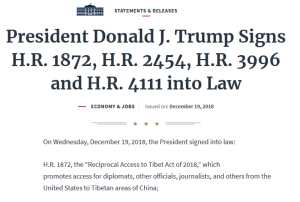
(TibetanReview.net, Dec21, 2018) – US President Donald Trump has, on Dec 19, 2018, signed into law HR 1872, the “Reciprocal Access to Tibet Act of 2018,” which promotes access for diplomats, other officials, journalists, and others from the United States to Tibetan areas of China, said a White House Statement Dec 19. He thereby committed the US government to work toward getting China to open the hitherto effectively closed occupied Tibet for US citizens, especially diplomats and other officials, journalists, and Tibetan citizens of the USA.
China not only sought to pressurize individual US lawmakers from supporting the bill when it was being debated but also publicly criticized the legislation and asked President Trump not to sign it into law. However, not only was the bill passed unanimously in both the Houses of the US Congress but also President Trump took little time to sign it into law.
This law marks a new era of US support for Tibetans and a challenge to China’s discriminatory policies in Tibet, said Washington-based International Campaign for Tibet (ICT) which has been lobbying for the legislation since 2014. The bill lapsed twice, in 2014 and 2015, as it never went to vote.
In 2017, it was reintroduced in the House by Reps. Jim McGovern (D-Mass.) and Randy Hultgren (R-Ill.) and in the Senate by Sens. Marco Rubio (R-Fla.) and Tammy Baldwin (D-Wisc.). Approved unanimously by the House Judiciary Committee on Jul 25, 2018, it was passed by the entire House and referred to the Senate after exactly two months.

The Senate Foreign Relations Committee approved the bill unanimously on Nov 28, and the full Senate passing it likewise on Dec 11. The bill became law when Trump signed it on Dec 19.
American law now requires for its diplomats, journalists and ordinary citizens to have equal access to the Tibet Autonomous Region and other Tibetan areas as being already enjoyed by their Chinese counterparts in the US.
The Act requires the Secretary of State to assess Americans’ level of access to Tibet within 90 days of its enactment and to send a report to Congress every year afterward identifying the Chinese officials responsible for keeping Americans out of Tibet. The Secretary will then ban those officials from receiving visas to enter the US.
“I’m glad that the President signed our bill, the Reciprocal Access to Tibet Act, into law. For too long, China has covered up their human rights violations in Tibet by restricting travel. But actions have consequences, and today, we are one step closer to holding the Chinese officials who implement these restrictions accountable,” Rep. Jim McGovern (D-Mass), who introduced the bill in the House, was quoted as saying.
And he has made it clear, “I look forward to watching closely as our law is implemented, and continuing to stand with the people of Tibet in their struggle for religious and cultural freedom.”
In its feeble responses to the US legislative move, China has talked about its permit system and entirely unconvincing excuses about limiting visitors to Tibet. Tens of thousands of tourists from other countries and tens of millions of Chinese citizens visit Tibet every year in normal times but diplomats, journalists and the like were never allowed unless taken on strictly chaperoned and sponsored official tours to stage-managed sites to talk with tutored interviewees.
ICT said the Act will help curtail human rights abuses in Tibet by pressuring China to open the region to outside observers.
ICT is now working to get other major democratic countries to follow the US example. “We are already in discussion with political leaders in Canada, the United Kingdom, Australia and countries in Europe who are calling for a similar reciprocal access to Tibet law for the citizens of their respective countries,” said ICT President Matteo Mecacci.





